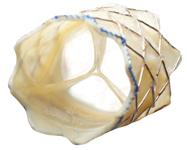
January 25, 2010 - In a significant development in treating congenital heart disease, the Medtronic Melody Transcatheter Pulmonary Valve today became the first transcatheter valve approved for use by the FDA.
The device received market clearance under a humanitarian device exemption (HDE). Delivered through a catheter and eliminating the need for surgery, the Melody valve will benefit children and adults who are born with a malformation of their pulmonary valve. Previously open-heart surgery was the primary option to restore effective blood flow to their lungs. To date, more than 1,100 patients worldwide have received a Melody valve.
“The Melody Transcatheter Pulmonary Valve is a significant technological breakthrough and offers a reprieve for many patients with congenital heart disease – many of whom are young and will require several heart surgeries over their lifetime,” said pediatric cardiologist William E. Hellenbrand, M.D., of the NewYork-Presbyterian Morgan Stanley Children’s Hospital and Columbia University Medical Center. “The Melody valve gives patients with congenital heart disease a new, nonsurgical approach to managing their disease.”
In October 2006, the Melody valve became the first transcatheter valve to receive regulatory approval anywhere in the world, when it received the CE (Conformité Européenne) mark clearance in Europe. It is now approved for use in the United States under an HDE, a special regulatory approval for treatments intended for fewer than 4,000 U.S. patients per year. HDEs are granted for medical devices that have demonstrated reasonable safety and probable benefit, but not clinical effectiveness.
The Edwards Lifesciences' SAPIEN transcatheter aortic valve is currently in FDA trials and is widely expected to be the next transcatheter valve to gain FDA clearance.
Catheter-delivered heart valves are expected to replace most of the current open-heart surgeries used to repair congenital heart valve defects. Transcatheter valves offer shorter and easier procedures, less trauma to patients, faster recover times, and offer a nonsurgical alternative to patients who are not fit to undergo surgery.
For more information: www.medtronic.com


 December 24, 2025
December 24, 2025 









